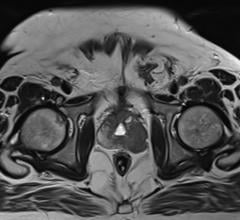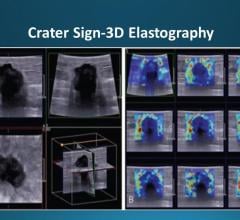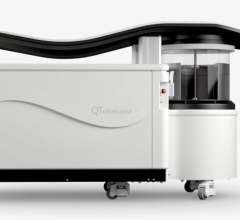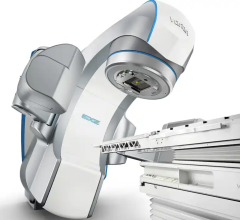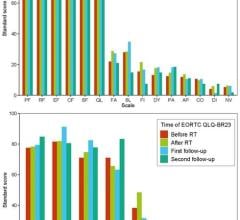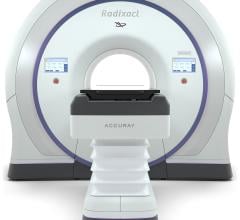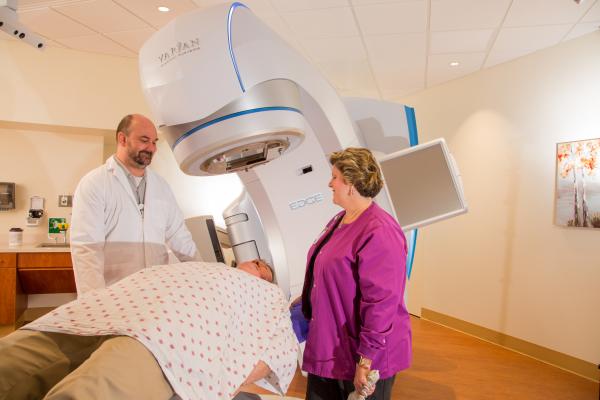
August 29, 2018 — Although the success or failure of radiation therapy for cancer has long been associated with the intrinsic radio-resistance or radio-sensitivity of tumor cells, a new approach is demonstrating that radiation can take credit for an additional benefit -- causing highly effective secondary immune responses that can enhance anti-tumor immunity.
In the past decade, researchers Ralph Weichselbaum, M.D., and Yang Xin Fu, M.D., Ph.D., have promoted the concept that how the host immune system interacts with therapeutic radiation is just as important as radiation itself. The cellular carnage caused by radiation attracts scavengers, such as dendritic cells. These warriors chew up radiation-damaged cancer cells and present the fragments to T cells that dismantle them.
In the Sept. 18, 2018 issue of the journal Immunity1, available online Aug. 28, the Weichselbaum-Fu collaboration demonstrates how specific interactions between therapeutic radiation and a potential patient's innate and adaptive immune responses can improve cancer treatment.
The researchers focused on how two versions of the nuclear factor-κB (NF-κB) signaling pathway respond to radiation therapy in opposing ways. NF-κB1, first described in 1986 by Nobel laureate David Baltimore, was proposed as a major regulator of the immune system's B cells. This canonical pathway — and the less known 'non-canonical' pathway — have become a major focus for a variety of areas in biology, including inflammation, immunity and cancer.
"Inhibiting what is known as the canonical NF-κB family has been shown to increase cancer cell killing in tissue culture and has become an area of investigation to improve cancer radiotherapy," said Weichselbaum, professor and chairman of radiation oncology at the University of Chicago. "But despite extensive investigation," he added, "earlier results from these studies failed to improve the response to radiotherapy in animals or humans."
In the current study, teams led by Weichselbaum and Fu, professor of pathology at the University of Texas Southwestern Medical Center, worked with mice to show that disrupting this pathway actually makes radiotherapy less effective. It inhibits rather than enhances the immune system.
Instead, they found that interfering with the non-canonical NF-κB pathway improved the effects of radiotherapy by enhancing the immune system's ability to interact with radiation. Their findings, obtained in genetic models in mice, were buttressed by biochemical studies. The results suggest novel ways to improve treatment by combining radiation and immunotherapy.
"When we irradiate tumor cells, the immune system essentially gobbles up the DNA they release," Weichselbaum said. The damaged DNA attracts a series of enzymes. These activate a pathway called STING, that recognizes viral and bacterial DNA. "We were surprised to find that it also responded to damaged exogenous DNA," said Weichselbaum.
When they blocked NF-κB, the tumors in the mice got worse instead of better. The immune system in those mice was impaired. When the researchers blocked the non-canonical NF-κB pathway, however, the animals' tumors were more easily eradicated with radiation.
"A lot of drug discovery has been focused on blocking the canonical NF-κB pathway, Weichselbaum said, "but now we think that this impairs the host immune system, whereas blocking the non-canonical NF-κB pathway can improve the host's immune system."
"We have learned that radiation therapy does depend on DNA damage and repair," Fu added. "The host immune system seems to have a lot to do with whether or not radiation works. So by blocking that alternative pathway, rather than the pathway everyone's been focusing on, we think we can get better radio-sensitizing agents, and better results."
This whole interaction between radiation and the immune system is "counterintuitive," Weichselbaum added. "The notion that radiation supplements the immune system is still somewhat controversial," he said.
The damaged DNA "is seen by the immune system as almost like a virus," he said. "The immune system responds as if it were a viral infection, which boosts the overall response. We think this could lead to a whole new therapeutic strategy. Our mice are often cured."
The authors caution that their work, still in animal models, is preliminary.
"We're looking for ways to develop it for people," Weichselbaum said. "It works even better when we add checkpoint inhibitors. This could become a novel combination approach to improving cancer treatment."
For more information: www.cell.com/immunity
Reference
1. Hou Y., Liang H., Rao E., et al. Non-canonical NF-κB Antagonizes STING Sensor-Mediated DNA Sensing in Radiotherapy. Immunity, Aug. 28, 2018. DOI:https://doi.org/10.1016/j.immuni.2018.07.008


 March 28, 2024
March 28, 2024 
